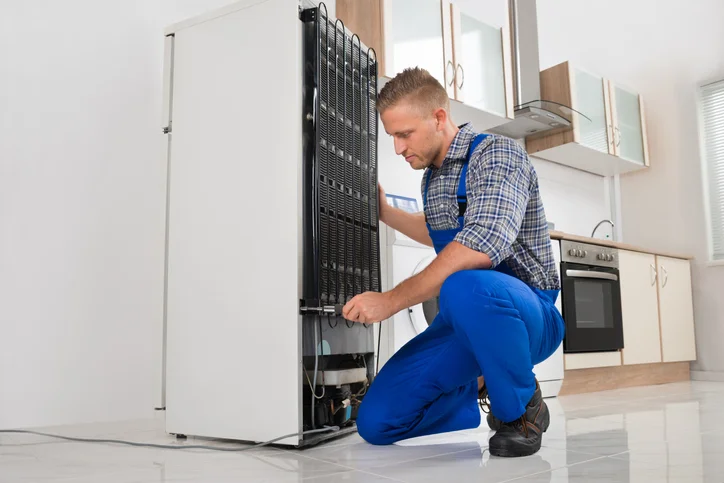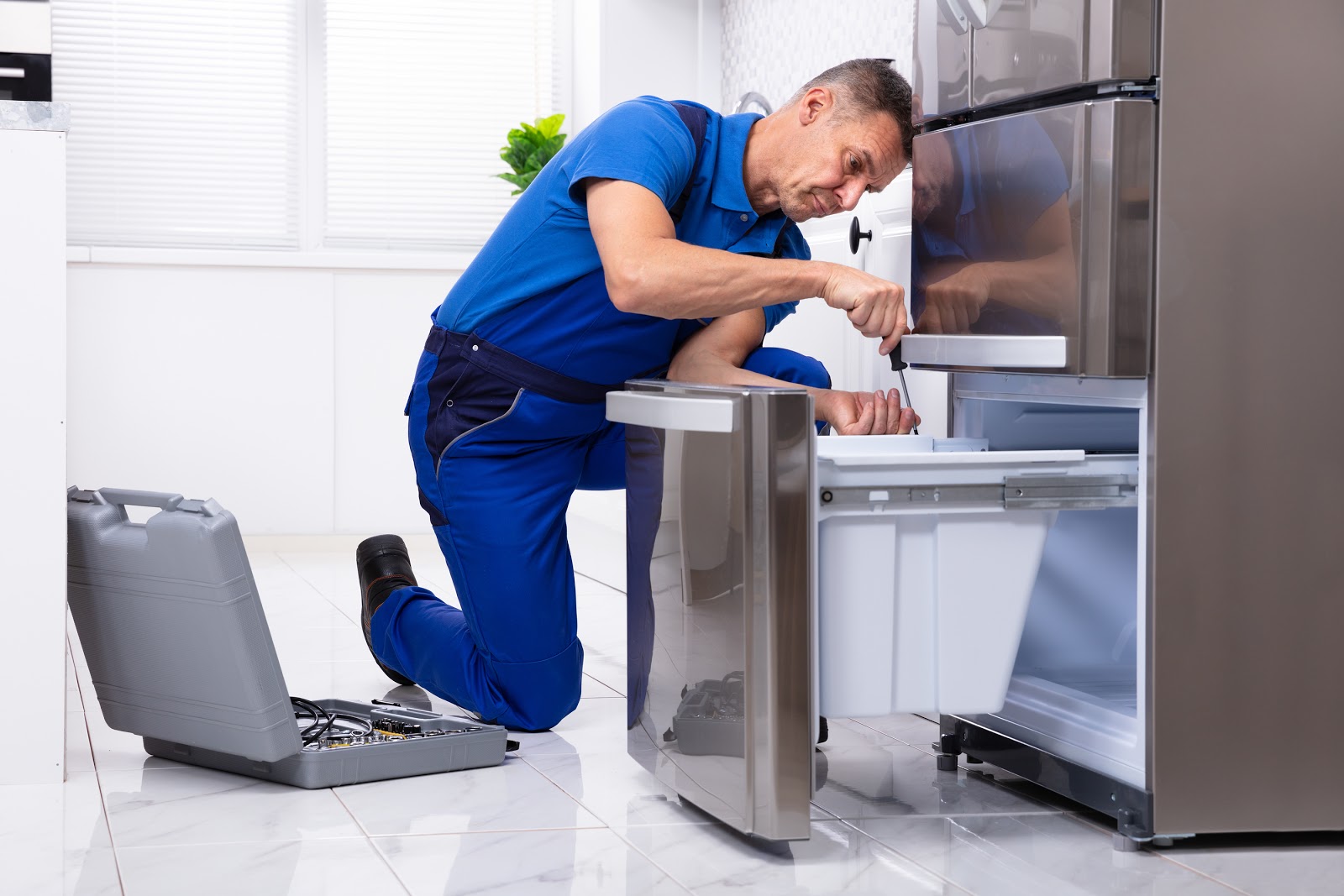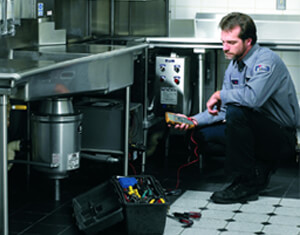Refrigerator Not Cooling? Refrigerator repair experts Dependable Refrigeration & Appliance Repair Offer Quick Troubleshooting Tips
Refrigerator Not Cooling? Refrigerator repair experts Dependable Refrigeration & Appliance Repair Offer Quick Troubleshooting Tips
Blog Article
Important Tips for Effective Ref Fixing to Expand Home Appliance Lifespan
When it comes to your fridge, appropriate fixing and upkeep are crucial for durability. Understanding typical troubles and recognizing when to act can make all the distinction.
Comprehending Typical Fridge Issues
Fridges are essential in keeping your food fresh, yet they can encounter an array of common troubles that disrupt their efficiency. If you discover food ruining quicker than usual, check the thermostat settings or take into consideration if the door seals are damaged. Identifying these concerns early can conserve you time and cash in repairs, ensuring your fridge runs efficiently and successfully.
Routine Upkeep Practices
To maintain your home appliances running efficiently, you require to stay on top of regular maintenance methods. Tidy the condenser coils, inspect the door seals, and monitor the temperature settings to guarantee peak efficiency. These easy tasks can conserve you time and cash on repairs down the line.
Clean Condenser Coils Consistently
Cleaning your condenser coils frequently can greatly enhance your home appliance's effectiveness. Dust and dirt build up on these coils over time, triggering your device to work more challenging and consume even more energy. To keep them tidy, unplug your home appliance and very carefully remove any protective covers.
Inspect Door Seals
3 straightforward actions can aid you ensure your home appliance's door seals are in excellent problem. Second, tidy the seals using warm, soapy water to remove any particles or grime. By following these actions, you'll keep your home appliance's effectiveness and long life, saving you cash on energy expenses and repairs in the lengthy run.
Display Temperature Settings
Regularly checking your device's temperature level settings is necessary for ideal efficiency and effectiveness. Whether you're handling a refrigerator, fridge freezer, or oven, watching on these settings can stop several concerns. For fridges, goal for temperatures between 35 ° F and 38 ° F; for freezers, stick around 0 ° F. If the temperature levels are too expensive or reduced, your home appliance may function harder, throwing away energy and shortening its life expectancy. Use a thermometer to examine these setups frequently, particularly after major changes, like moving your device or changing the thermostat. If you observe variations, readjust the setups appropriately and consult the individual handbook for advice. By remaining positive concerning temperature surveillance, you'll guarantee your home appliances run efficiently and last longer.
Repairing Cooling Issues
When your refrigerator isn't cooling down effectively, it can result in spoiled food and squandered money, so addressing the issue promptly is vital. Start by inspecting the temperature level setups to verify they go to the recommended levels, generally around 37 ° F for the fridge and 0 ° F for the fridge freezer. If the setups are proper, evaluate the door seals for any type of spaces or damages; a malfunctioning seal can permit warm air to go into.
Examine the condenser coils, normally situated at the back or bottom of the system. Tidy them with a vacuum cleaner or brush to optimize efficiency. If troubles linger, it could be time to call a professional.
Taking Care Of Water Leak and Ice Accumulation
If you're handling water leakage or ice accumulation in your home appliance, it's important to determine the resource of the issue. By determining where the water is coming from, you can stop additional concerns and stay clear of expensive repair work. Let's discover some efficient techniques to tackle these usual troubles.
Identify Leak Sources
Exactly how can you successfully identify the resources of water leakage and ice build-up in your devices? Begin by evaluating the seals and gaskets on your fridge and freezer doors. A worn or broken seal can permit warm air to enter, causing condensation and ice. Next off, examine Find Out More the drain frying pan and drainage system for blockages or clogs; a backed-up drainpipe can lead to water pooling. Seek any type of loose links in the water line, which can create leakages. Examine the defrost drain for ice buildup, which can interfere with proper drain. By methodically examining these areas, you'll pinpoint the source of the trouble, permitting you to take the required steps to repair it and expand your appliance's lifespan.
Prevent Ice Formation
To avoid ice formation in your home appliances, begin by validating the temperature setups are proper. If your fridge or freezer is also cool, it can result in excessive ice build-up. Inspect the door seals consistently; damaged seals can let warm air in, triggering condensation and ice development.
Keep the home appliance well-ventilated and stay clear of overcrowding, as this can block air movement - Who Repairs Dryers in Oro Valley? Dependable Refrigeration & Appliance Repair Service. Likewise, routinely thaw your freezer if it does not have an automatic defrost function.
If you see water leak, determine and fix any blocked water drainage holes, as they can add to ice build-up. Lastly, tidy the coils and confirm they're functioning appropriately to keep peak performance. Taking these steps will certainly aid prolong your appliance's life expectancy and effectiveness.
Attending To Noisy Refrigerator Sounds
While it may seem worrying, a noisy fridge often signifies small issues instead than major breakdowns. Usual offenders include the compressor, fans, and water lines.
Next, look for loose products inside. Sometimes, containers or racks can rattle, developing undesirable sound. Tighten or reorganize them to eliminate the noises.
If you see a clicking sound, it could be the defrost timer. This is normally safe yet might suggest it needs inspection.
Finally, confirm your refrigerator is level. An unbalanced home appliance can create resonances and noise. Utilize a degree to inspect, and readjust the feet if needed. Dealing with these problems without delay can aid keep your refrigerator's performance and extend its life expectancy.
When to Change Parts vs. Complete Substitute

Nonetheless, if your appliance is older and experiencing several issues, a complete replacement can be extra cost-effective. Think about the cost of fixings versus the appliance's worth. If fixings surpass 50% of a new device's rate, it's generally smarter to purchase a replacement. Additionally, if you notice ongoing problems that keep recurring, it's a sign that your home Click Here appliance has gotten to completion of its life. Weigh these elements meticulously to make the very best choice for your requirements and budget.
Recognizing When to Call an Expert
How can you inform when it's time to call in a professional for device repair service? If you observe unusual noises, scents, or leakages, it's a clear signal that something's wrong. Do not ignore these signs; they usually suggest much deeper issues. If your device quits working altogether or often trips circuit breakers, it's one more red flag.
You should also consider your own convenience degree with repair services. If you're unsure concerning diagnosing the issue or do not have the right tools, it's finest to connect for assistance. Remember, trying complex repairs can bring about more damages or perhaps security hazards.

Regularly Asked Questions
Exactly how Commonly Should I Clean the Fridge Coils?
You need to clean your fridge coils every six months. This helps preserve performance and protects against overheating. If you observe too much dirt or animal hair, clean them much more frequently to guarantee your refrigerator runs efficiently.

Can I Utilize Vinegar for Cleaning My Refrigerator?
Yes, you can make use of vinegar to cleanse your refrigerator! It's an exceptional all-natural cleanser that removes smells and discolorations. Dependable Refrigeration & Appliance Repair Service LG Appliance Repair. Simply mix it with water, use it to surfaces, and wipe down for a fresh, tidy fridge
What Temperature level Should My Refrigerator Be Ready To?
You ought to set your fridge to 37 ° F(3 ° C) for optimal food conservation. This temperature keeps your food fresh while protecting against perishing, guaranteeing your grocery stores last much longer and reducing waste. It's a very easy change you can make!
Does a Fridge Need to Be Leveled?
Yes, your fridge requires to be leveled. If it's uneven, it can affect cooling down performance and create excess sound. Examine the leveling legs and adjust them to ensure correct equilibrium for ideal efficiency.
Just How Can I Decrease Refrigerator Energy Intake?
To reduce your refrigerator's power intake, keep it clean and well-ventilated, inspect door seals for leakages, set the emergency refrigerator repair temperature level between 35-38 ° F, and prevent overloading it. These actions can substantially reduce your power expenses.
Report this page